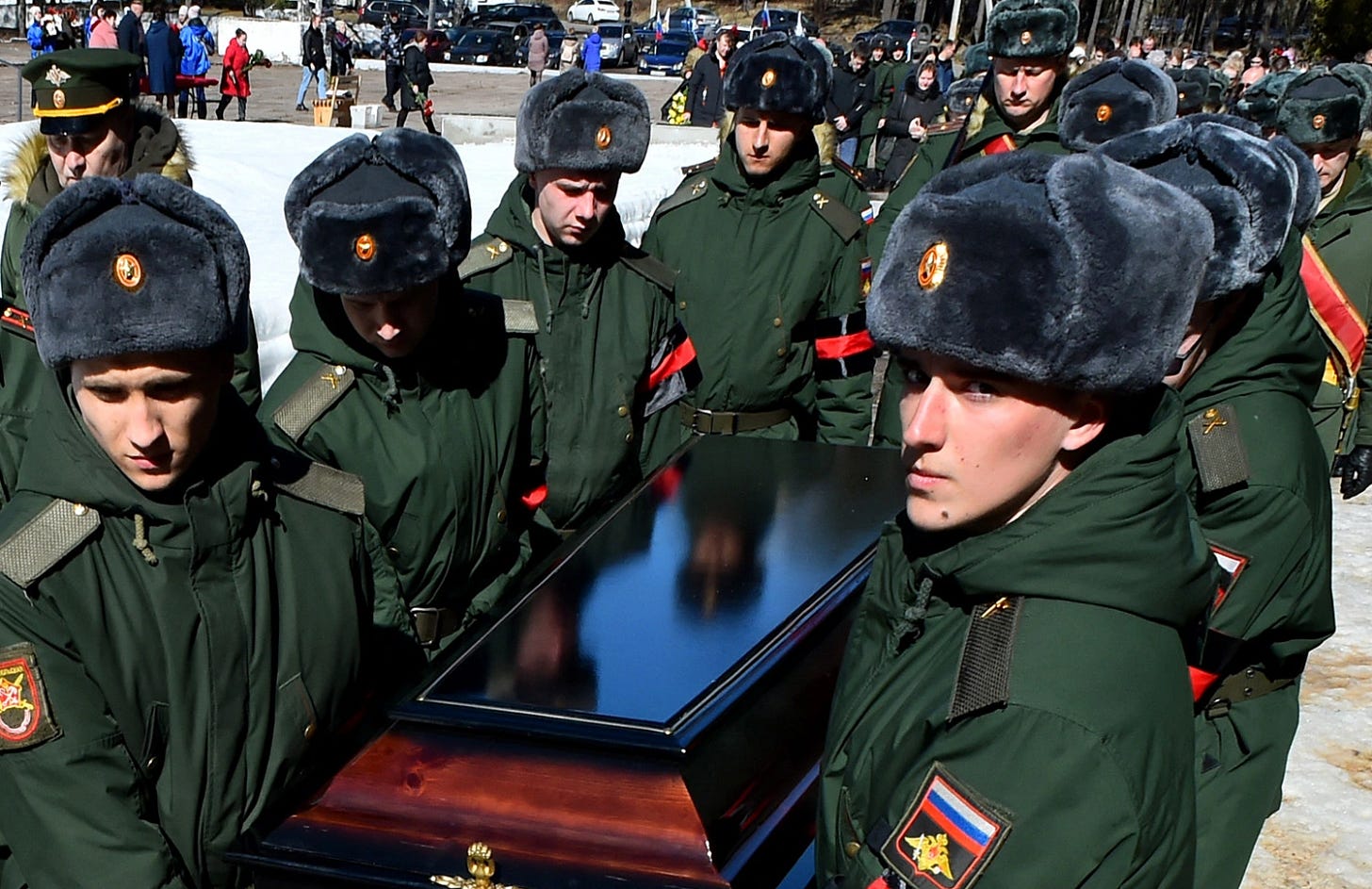Putin's Praetorians
The Battle for Bakhmut Reveals a significant split in the Russian War Effort
Recently, the Ukrainian city of Bakhmut (which had a pre-war population of just 70,000), was conquered by the Russians. A single city being captured by one side or the other is not, by itself, a major event. Plenty of small cities and towns have been conquered and re-conquered over the course of the 15-month war. What was remarkable about the capture of Bakhmut was the sheer amount of lives lost in the effort, and the tensions in the Russian state that its capture has revealed.
For over a year now, the Russian Armed Forces have been supplementing their enlisted men with paramilitaries, mostly from the Wagner Group, a Russian private military company (PMC). Mercenaries and PMCs have long histories of being rapacious and blood-thirsty, but this was newly on full display during the siege of Bakhmut, even more so because Wagner recruits directly from prisons. In the past five months, over 20,000 Russian troops were killed in gruesome emulations of World War I tactics, including “human wave attacks”.
This has widened the already-evident split in Russia’s military efforts to conquer Ukraine. Which, given the Russian Federation’s rank as having the 2nd most powerful military in the world, should have been a “cake walk.”
The first faction—the siloviki, the post-Soviet National Security bureaucrats—based around Minister of Defense Sergei Shoigu and Chief of the General Staff Valery Gerasimov, is a more traditional military grouping; this informal alliance believes in the supremacy of the Russian Armed Forces over those of the Wagner Group and other paramilitaries. Meanwhile, Yevgeny Prigozhin, leader of the Wagner Group, and his ally in the army, General Sergei Surovikin, occupy the pro-PMC half of the spectrum.
Neither of these groups substantially differs from the other in either politics or disposition towards Ukraine or NATO. Instead, the divisions are mostly internal splits that revolve around who the Russian Armed Forces should rely on—and thus give more support to. Prigozhin has claimed multiple times that Shoigu and Gerasimov have deliberately held up shipments of ammunition and equipment to Wagner Group mercenaries (despite evidence pointing to the fact that they are actually better-supplied than most regular Russian units). Additionally, he has blamed the siloviki faction for allowing 20,000 Wagner troops to be killed in the Battle for Bakhmut.

The split began almost as soon as Wagner troops were deployed in the Autumn of 2022, but has only come to the forefront with the attempted capture of Bakhmut—a five-month-long siege that the Wagner troops failed to carry through on, resulting in a corresponding loss of face for Prigozhin. Furthermore, leaked evidence has pointed to his continued contact with the head of the Ukrainian intelligence service—another reason for his falling star in Moscow and the distrust associated with the Wagner Group in general.
The extended amount of time needed to capture Bakhmut—a strategically irrelevant town except for its potential as a logistics hub—has put Prigozhin on a direct collision course with the Kremlin. Even worse for him, on May 5th, Prigozhin referred to a “happy grandpa...who thinks everything is fine”, most likely a reference to Vladimir Putin. The Kremlin did not address this directly; likely because Prigozhin had plausible deniability and could have been referring to either Gerasimov or Shoigu. Still, the much-weakened Wagner may have ironically made the siloviki faction content to simply wait for Prigozhin to become more and more weak and eventually irrelevant.
It is difficult to say what will happen to Wagner from this point on. While it will almost certainly continue fighting in Ukraine, it is in a much-diminished state—only 15,000 men from its former height of 50,000—a the strength of the regular Russian military has been bolstered, with over 500,000 troops deployed in Ukraine. It is increasingly likely that Prigozhin and Surovikin will continue to be marginalized as the fighting wears on, and especially after the Russian failures in and around Bakhmut.
In fact, Prigozhin’s troops have already started handing over control of Bakhmut to the Russian Armed Forces, which is certainly a bitter pill to swallow for the mercenary leader. It is only made all the more ironic after his claims that he would pull out of the city on May 10th if not given more support—a date that came and went—and now that Bakhmut has fallen to the Russians, he is being forced out instead.





